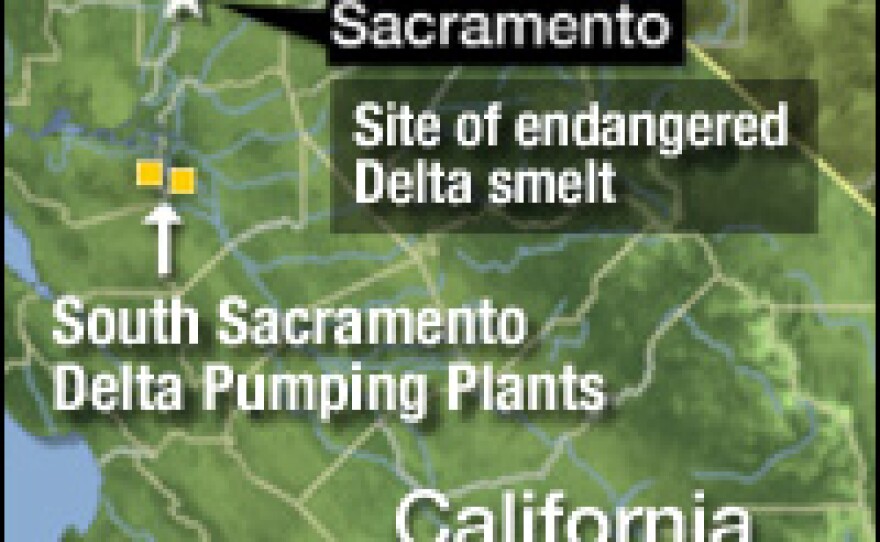

Severe droughts have combined with an unexpected culprit — a tiny fish — to put the squeeze on Southern California's water supply. Farmers in places like San Diego County are the first to feel the pinch.
Last month, the Metropolitan Water District, which supplies water to 18 million mostly urban customers in Southern California, started cutting water supplies to most agriculture customers by 30 percent. Urban users still have unlimited water.
Deal with the Devil
The cutbacks have their roots in California's last big drought, which took place in the late 1980s and early '90s. After that, the Metropolitan Water District invested in big water-storage projects, and to pay for them, it doubled water prices over a short time.
To keep their businesses afloat, most farmers made a kind of "deal with the devil."
"The deal was that, in exchange for a discount on the water rate, we would be willing to take the first cutbacks in an emergency situation," says Al Stehly, who manages about 450 acres of avocado trees for himself and other landowners in the county.
For 50 years, farmers like Stehly have been using water pumped in from the Colorado River and from Northern California to turn the dry, hilly landscape northeast of San Diego into lush groves and fields.
These, days avocados are the biggest crop. In fact, San Diego County is the country's biggest avocado producer.
Stehly shows off the steep slope where he grows 60 acres of avocados in rural Valley Center. Nothing but sagebrush would grow here before he started irrigating it and planting trees.
"We've got really good weather, but without the water, I really can't grow anything," Stehly says.
In the heat of the summer, he gives each tree about 300 gallons of water, and his water bills run $14,000 a month.
Drastic Measures
Because of the 30 percent cut in water supply, Stehly plans to take chainsaws to about 1,200 trees — a quarter of his grove. He will cut them down to about four feet tall and try to keep the stumps alive by giving them about a tenth of the water they usually need.
"We're going to kind of put them in suspended animation, hoping that the cutbacks are lifted and we can resurrect them," he says.
Stehly is stoic about the situation, but some other farmers are spitting mad.
"The price of water is bad enough, but then when they tell us we've got to cut by 30 percent, then you stop and say, 'OK, what will I do?'" says Gary Broomell, who has been growing oranges and grapefruits in Valley Center for almost 50 years.
Broomell says with competition from imported fruit, and pressure to sell out to developers, growers had to take the deal the water agency offered.
"We had no choice," he says. "We can't pay the full price. That's a given, especially in citrus. If we were paying the full price the last 10 years, we wouldn't be here anymore."
Delta Smelt
Broomell blames environmentalists for stopping projects that would bring more water to the region, and for pushing a lawsuit to protect a tiny endangered fish, called the Delta smelt, that lives hundreds of miles away. He says he's in an untenable situation.
"I honestly think it's more manmade than Mother Nature," Broomell says of the farmers' water crisis.
Broomell's take stems from a decision by a federal judge in Fresno to protect the smelt, which live in the Sacramento Delta, east of San Francisco Bay.
"These powerful pumps that are at the south of the Delta basically pull the smelt towards it. And when they get into the pumps they, of cours,e get killed," says Jeffrey Kightlinger, general manager of the Metropolitan Water District.
The court ordered the agency to stop pumping during the winter months, when the smelt are near the pumps. That reduces the water Southern California gets from Northern California by about 25 percent to 30 percent, according to Kightlinger.
Climate Change Impact
The ruling could not have come at a worse time, Kightlinger adds.
"The Colorado River is in its eighth year of drought, and Northern California also had a very dry year this past year. And then we had last year, the driest year ever recorded in the Los Angeles basin," Kightlinger says.
Kightlinger says it's not clear what role climate change plays in California's water shortage.
But late last month, researchers from the University of California at San Diego reported that emissions of greenhouse gases, such as those from cars and power plants, are to blame for the shrinking snow pack in the mountains of the West. And they predict that the snow pack and water supply will decline even more.
Kightlinger said he does not know how long the farmers will be shorted.
But farmers in San Diego County predict it will be a multi-year problem. And Stehly says it might be time to start thinking about a new crop that uses less water.
"I really enjoy wine, so maybe we'll try making some wine," Stehly says.
Copyright 2022 NPR. To see more, visit https://www.npr.org. 9(MDAzMjM2NDYzMDEyMzc1Njk5NjAxNzY3OQ001))





